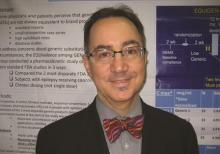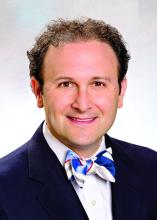Switching between generic versions of the same antiepileptic drug made by different manufacturers does not appear to change the risk of seizure-related events in patients with epilepsy, according to a population-based, case-crossover study of generic antiepileptic drug users.
Instead, the study indicates that delays and complications of the medication refilling process might increase a patient’s risk for a seizure, said first author Aaron Kesselheim, MD, and his associates from Brigham and Women’s Hospital and Harvard Medical School, Boston (Neurology. 2016 Sep 28. doi: 10.1212/WNL.0000000000003259).
“These results add to the growing literature supporting the routine use of interchangeable generic [antiepileptic drugs] among patients with seizure disorders,” the investigators wrote.Although the results of previous observational studies have demonstrated increased seizure activity following a switch from brand name to generic antiepileptic drugs, Dr. Kesselheim and his associates pointed out that several recent randomized trials have found no link between generic drug switching and seizure risk.
The investigators identified 59,344 patients who had at least one refill of a prescription from the same manufacturer and 5,200 patients who switched from one generic to another during 2000-2010 in the Medicaid Analytic eXtract database as well as during 2005-2013 in a commercial health insurance database. Participants acted as their own controls in the study’s comparison of the effects of a refill or a refill with a switch in manufacturer on seizure-related events (a seizure requiring an emergency department visit or hospitalization) during a hazard period, defined as days 2–36 preceding a seizure-related event, and a control period, defined as days 51–85 preceding the seizure-related event.
Overall, generic antiepileptic refilling of the same medication from the same manufacturer was associated with an 8% increase in the odds of having a seizure-related event (95% confidence interval, 1.06–1.11). When the refill involved a switch to the same generic drug made by a different manufacturer, the odds of a seizure-related event rose by 9% (95% CI, 1.03–1.15). When this involved a change in the shape or color of the pill, the odds increased by 11% (95% CI, 1.05–1.18) but did not increase when the switch was made to a pill with the same color and shape. The increased odds of seizure-related events became nonsignificant when the researchers adjusted these comparisons for the process of refilling, which the authors noted “is often not straightforward. [And] patients have expressed frustration with delays and other complicating factors relating to refilling. … Greater work to enhance the refilling process, and to determine whether mail order pharmacies successfully improve outcomes on this point, is necessary.”
The study was not supported by any specific targeted funding. The investigators reported receiving support from various foundations and from programs within Harvard University and grants from the Agency for Healthcare Research and Quality and the Food and Drug Administration; the investigators also disclosed acting in a research support role for and/or receiving financial compensation from several pharmaceutical companies and other organizations.
On Twitter @jessnicolecraig




